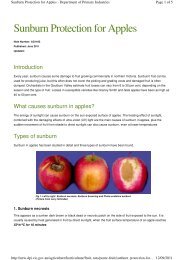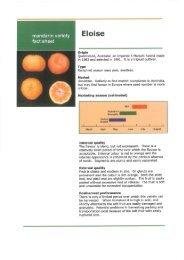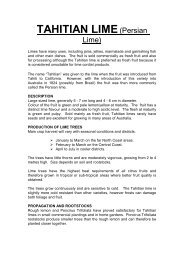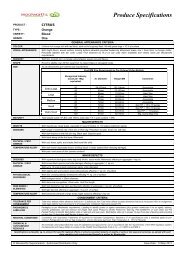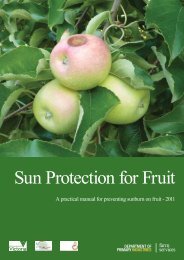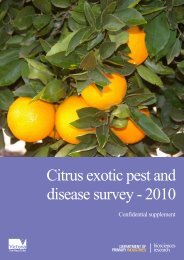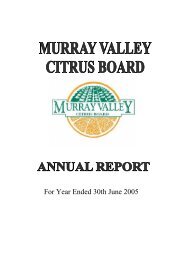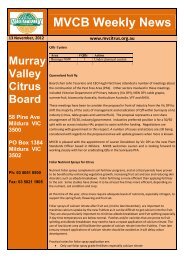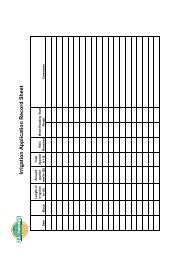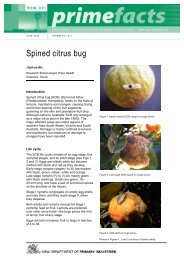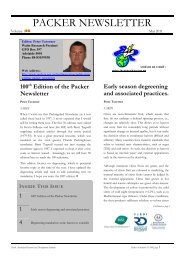Citrep #70 December 2012 - Murray Valley Citrus Board
Citrep #70 December 2012 - Murray Valley Citrus Board
Citrep #70 December 2012 - Murray Valley Citrus Board
Create successful ePaper yourself
Turn your PDF publications into a flip-book with our unique Google optimized e-Paper software.
Among significant challenges confronting<br />
growers is the Queensland fruit fly (Qff),<br />
resulting in post harvest costs of treatment<br />
for both domestic and export markets; the<br />
collapse in price for local content in juice<br />
and the high exchange rates impacting<br />
on returns for export fruit, leading to an<br />
oversupply in domestic markets.<br />
The <strong>Murray</strong> <strong>Valley</strong> <strong>Citrus</strong> <strong>Board</strong> (MVCB)<br />
will continue to address these key issues<br />
with the intention of closely monitoring<br />
the situation, taking a researched and<br />
strong grower advocacy role with all the<br />
relevant agencies involved in these areas<br />
of concern.<br />
We have no influence over our exchange<br />
rates. It would be in our best interests if<br />
the US economy was to improve, and did<br />
so quickly. An upswing in US economic<br />
fortunes would bring about increased<br />
investment in the US, thus leading to an<br />
improved US dollar and a corresponding<br />
lowering of the Australian dollar.<br />
In the meantime, growers are seeking to<br />
supply other markets, which in some cases<br />
are more exacting in terms of protocol<br />
requirements (e.g. Fullers Rose Weevil).<br />
On farm practices to achieve these<br />
protocols are costly, and there needs to<br />
be a commensurate return on investment.<br />
By sending product to other markets, the<br />
pressure on domestic markets is lowered.<br />
Maintaining the balance between export<br />
and domestic markets benefits all growers.<br />
Our <strong>Board</strong> shares the concerns of all<br />
growers about the declining content of<br />
locally grown product used in juice. Much<br />
of the overrun in the last two seasons has<br />
been dumped. Several factors contributed<br />
2<br />
Hugh Flett<br />
Newsletter of the <strong>Murray</strong> <strong>Valley</strong> <strong>Citrus</strong> <strong>Board</strong><br />
Chief Executive’s Report<br />
The citrus industry continues to experience testing times, particularly in some key areas.<br />
to this situation. Two years ago, a light<br />
crop meant that there was insufficient<br />
locally grown content and juice companies<br />
moved towards importing larger volumes<br />
of frozen juice concentrate, much of<br />
which is produced in countries with far<br />
lower production costs than in Australia.<br />
This is now entrenched as the preferred<br />
production technique for juice products<br />
within Australia.<br />
Poor labelling laws also contribute to the<br />
problem. Before the introduction of Free<br />
Trade Agreements, it was a legislated<br />
requirement that juice produced in<br />
Australia had to contain 25% locally grown<br />
content. Our <strong>Board</strong> intends to make<br />
representations on behalf of growers,<br />
to both sides of politics in Canberra.<br />
In this context, the state of the citrus<br />
industry is the key issue on the agenda.<br />
If a viable industry is to remain, then<br />
actions are required to be implemented<br />
at a Federal level.<br />
At this stage, it appears likely that<br />
similar discussions on the current state<br />
of the citrus industry will be held with<br />
the Mildura Rural City Council (MRCC),<br />
the <strong>Murray</strong> Group of Councils (MGOC),<br />
Victorian and NSW DPI and Biosecurity<br />
Australia regarding protocols. It is<br />
important that these agencies are reliably<br />
informed and they may be able to provide<br />
further advocacy and facilitation. We will<br />
notify growers when these meetings take<br />
place and the outcomes that eventuate.<br />
The MVCB has so far distributed over<br />
14,000 litres of Naturalure chemical, free<br />
of charge to those citrus growers inside<br />
the 1500m radius of Qff outbreaks. We<br />
commend these growers for applying baits<br />
on farm to eradicate this serious pest. It is<br />
estimated that grower returns have been<br />
hit with an additional $10m in costs to<br />
treat, following the harvest, for the last<br />
two seasons. There is light on the horizon.<br />
The number of outbreaks has fallen and<br />
there have been very few Qff detections<br />
in recent times. Potentially, any of the<br />
remaining outbreaks will be declared<br />
closed early in 2013, provided no further<br />
flies are detected.<br />
The MVCB is working through a proposal<br />
from the Victorian DPI to deregulate<br />
Qff as an exotic pest for the remainder<br />
of Victoria (including the Vic market).<br />
This will place additional pressures on<br />
our Pest Free Area (PFA) boundaries. In<br />
addition, the DPI is looking for industry<br />
to cover 70% of all costs for Qff control<br />
and eradication for the remainder of<br />
<strong>2012</strong> and beyond. The MVCB and other<br />
industry groups are still in negotiations<br />
with the Department about how this may<br />
effectively work in the future.<br />
Qff will remain a key activity of the MVCB<br />
until such time as the region returns to a<br />
PFA. Living with Qff simply costs too much<br />
and risks our access to important overseas<br />
markets.<br />
For these important reasons, the <strong>Board</strong><br />
will remain focussed on developments<br />
and outcomes in these areas. At the same<br />
time, every effort will be made to see that<br />
growers remain fully informed.<br />
Hugh Flett<br />
CEO, MVCB<br />
The <strong>Board</strong>, CEO and staff of the MVCB extend best wishes<br />
to all growers for an enjoyable and safe Christmas. Our hope<br />
is that we can all look forward to a rewarding New Year.



